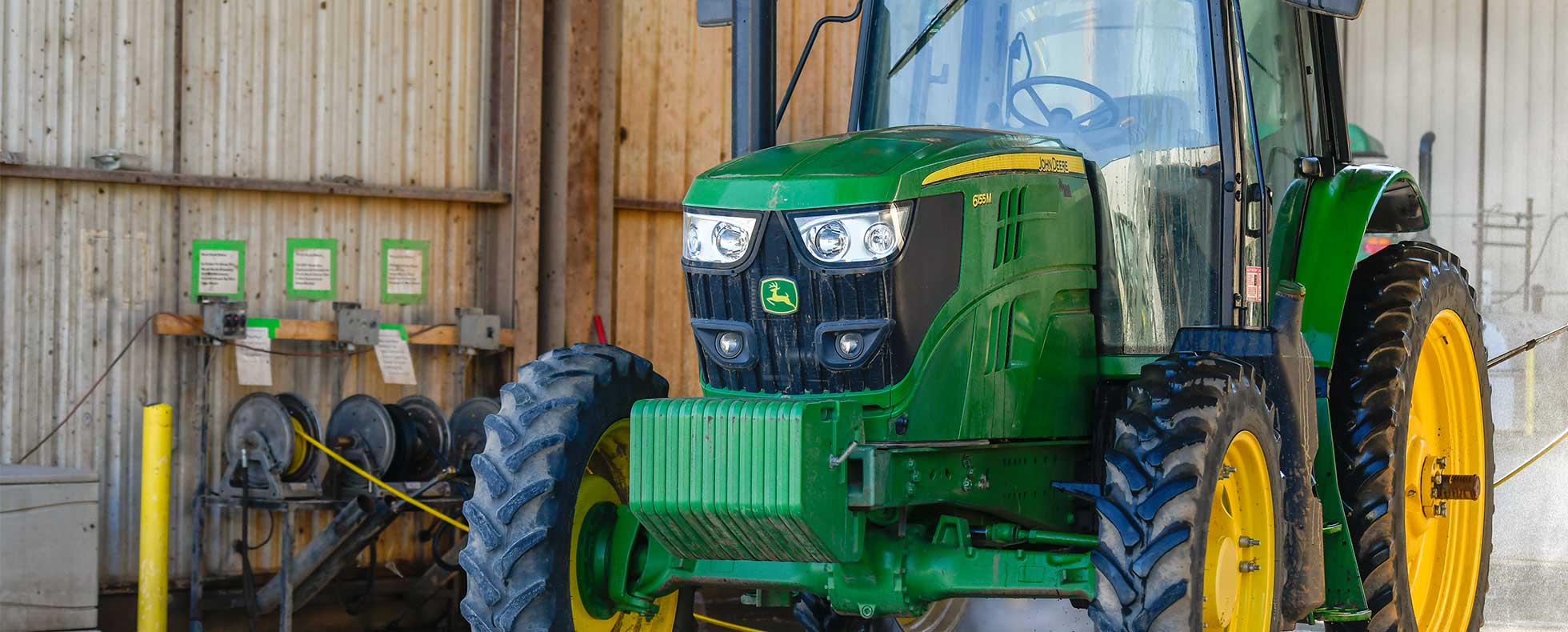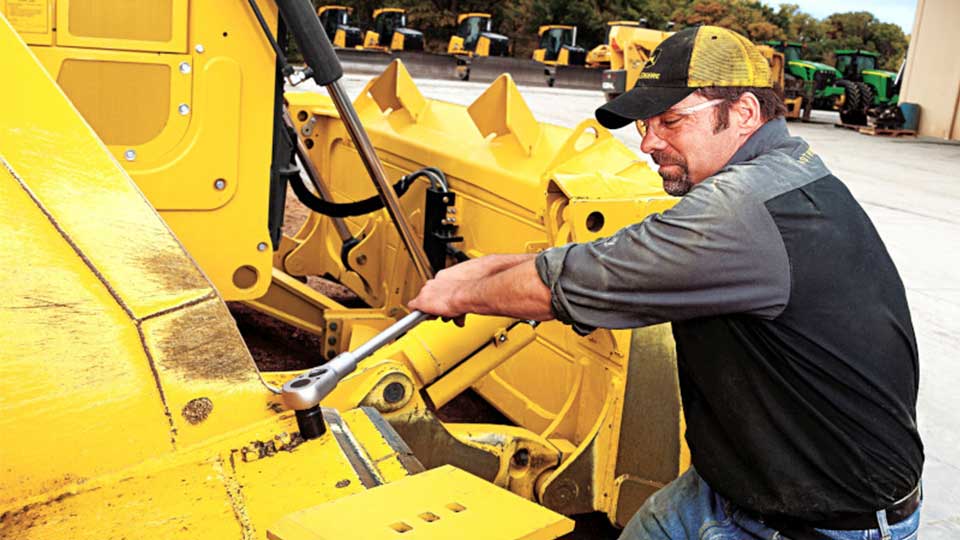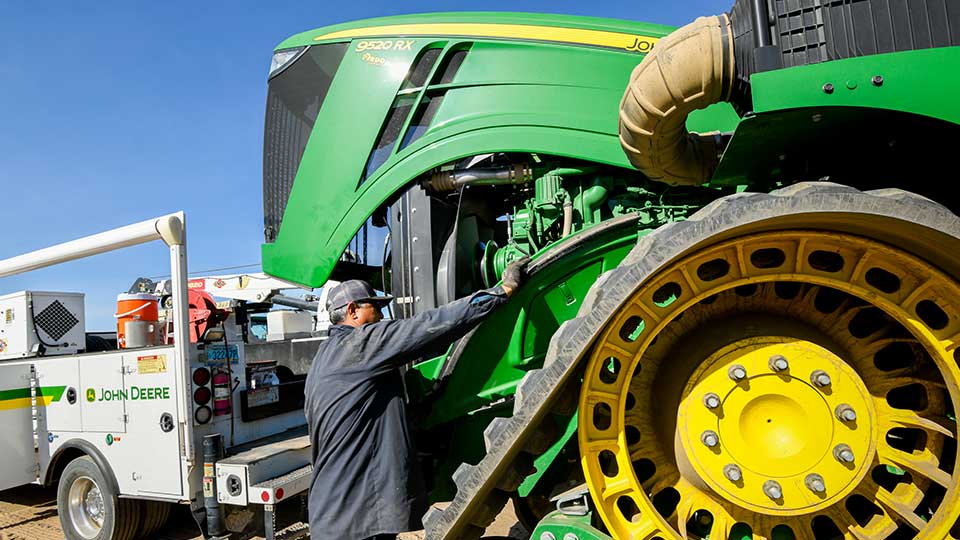
If you’re a talented mechanic, there’s a lot of demand for your skills and experience.
This demand exists in all kinds of industries, the automotive world is just one of them.
While being an auto mechanic can be a great career, you might wonder whether working on heavy equipment could be a better fit. This is an important question, as working on heavy machinery as a mechanic has plenty of advantages.
At RDO Equipment Co., we’ve hired many former auto mechanics on our service teams over the years. Usually, this has been great for these team members and their skills have made them highly successful. Could this work for you too?
In this article, we’ll break down some of the most important things to know about leaving the auto industry for a job working on heavy equipment (like construction, agriculture and forestry machinery). That way, you’ll have a better understanding of your options as you consider your future.
There are many reasons for making this career change, and yours would probably differ from the next person's. As a mechanic, you have many options for where your career goes. You can work on automobiles, class-8 semi-trucks, aircraft, generators and countless other types of machinery and equipment.
For some, switching from the automotive to the heavy equipment realm feels like a natural next step in their career — moving from minivans, cars, SUVs and pick-up trucks to dozers, combines and dump trucks. Others are just looking for a change — after a while, it can be nice to find a new challenge in your career.
Whatever the reason may be, jumping from a career in automotive technology to heavy equipment will come with some growing pains.
Sign Up: Service Technician Monthly Newsletter
Become a more profitable, successful mechanic with insights and resources sent to your inbox every month.
All told, there’s not much difference between the actual technical work you’ll do as a heavy equipment mechanic coming from the auto world.
Large pieces of machinery — though more complex in some ways — have a lot of the same systems and components as the cars you’re used to working on. Sure, things are bigger, and you may need to purchase some additional/alternative tools, but expect to encounter things that are very familiar — this includes electrical, fuel, cooling and braking systems and technology.
The two large differences between automotive vehicles and heavy machinery that you’ll need to learn are hydraulics and diesel engines. You won’t have worked with these components in the auto realm, but heavy equipment technicians do every day.

For many, transitioning into the heavy equipment industry after a successful stint working in automotive is possible and exciting. Here are some of the top advantages:
Compared to cars and SUVs, working on large equipment can actually be easier on the body in some ways. Since these machines are bigger, mechanics aren’t consistently working within tight spaces (shoving arms into small areas, climbing under vehicles, etc.).
With heavy equipment, there are often more open spaces between components, making it easier to perform work without getting into awkward, compressed positions.
Another advantage of this switch is the customer base. As a heavy equipment mechanic, you’ll work on large machinery central to the customer’s business, income and success. For this reason, in many cases, they’ve budgeted for the repair work you’ll be performing. So, although it’s still inconvenient, there’s sometimes a different dynamic (from a customer service perspective) between a technician and their customer.
Beyond this, the equipment these technicians work on is vital to the success of the U.S. and the world. For example, if you’re working on agriculture machinery, you know it involves food production. Getting this equipment back up and running can be a fulfilling job.
Compensation is different for heavy equipment mechanics. In the automotive industry, there’s a lot more efficiency-based or “flat rate” pay. Flat rate pay is compensation that's paid to the mechanic per each job they complete. While this can have several advantages for technicians who are quick workers, it’s not always the best compensation structure when things are slower.
In heavy equipment, this isn’t nearly as common. Instead, you should expect to receive an hourly wage (technicians at RDO, for example, receive an hourly wage and are eligible for a quarterly profit sharing). This creates a more stable paycheck.
Additionally, as you progress in your career, the income potential in heavy equipment technology is typically higher than in the automotive industry.
From a work-type perspective, there’s more opportunity to get out of the shop environment as a heavy equipment technician. Since many issues/breakdowns happen before machinery can make it to a dealership or shop, mobile (or field) mechanic jobs are common within the heavy equipment world.
If you’re interested in this, transitioning from the auto industry, where these jobs aren’t nearly as common, might be a good idea.
Here are some potential downsides to consider when evaluating whether this transition is right for you.
This is important to consider. Large diesel-powered machinery and equipment is fairly complex and it will take time to learn them. You will probably have to be trained on each product line you’re working on. RDO, for example, has in-house capstone programs for technicians.
If you’re not interested in learning new skills, systems, components and maintenance techniques, this transition will be tough.
Although you might have a really great background in automotive technology, this won’t necessarily earn you the same pay level in the heavy equipment world. This is especially true if you’ve worked in automotive for a long time.
To make this switch, you may make less initially while you learn the new skills needed to fix heavy machinery and equipment reliably.

If you haven’t changed jobs in a while, you might not realize how difficult this can be — especially if you’ve been at your current employer for a while. You’ll have to learn new internal systems, create new relationships with coworkers and develop a new routine, all while learning about the equipment you’ll work on.
While this is expected, don’t underestimate this part of the equation. This is a big decision.
Making this change in your career is a big decision. While there are advantages to this switch (earning potential, career options, learning opportunities, etc.) there are also some downsides (you’ll have to do some training and your pay may change compared to what you made after years in the automotive realm).
If you’re interested in exploring this further, your next step is to learn more about what it’s really like to work as a heavy equipment technician. Read A Day in the Life of a Service Technician at RDO Equipment Co. for some insight.
As a growing organization, we’re always excited to add motivated service technicians to our team. Find an open position near you and complete the application (less than 10 minutes) to start your career with RDO today. If you have any questions about our careers, contact our careers team and we’ll get back to you as soon as possible!